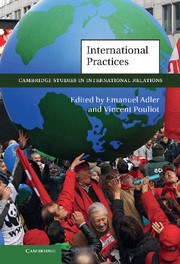Book contents
- Frontmatter
- Contents
- Figure
- Note on the contributors
- Acronyms and abbreviations
- Part I Practices in International Relations and social theory
- Part II Practices and their background
- Part III The evolution of practices
- Part IV Practices in practice
- 9 Banking on power
- 10 The practice of political manipulation
- 11 Performing practices
- 12 Privatization in practice
- Part V Conclusion
- Index
- References
10 - The practice of political manipulation
from Part IV - Practices in practice
Published online by Cambridge University Press: 05 June 2012
- Frontmatter
- Contents
- Figure
- Note on the contributors
- Acronyms and abbreviations
- Part I Practices in International Relations and social theory
- Part II Practices and their background
- Part III The evolution of practices
- Part IV Practices in practice
- 9 Banking on power
- 10 The practice of political manipulation
- 11 Performing practices
- 12 Privatization in practice
- Part V Conclusion
- Index
- References
Summary
Otto von Bismarck is widely credited with keeping Germany on a course for peace from 1871 to 1890 by being a “brilliant diplomatic tactician” who outmaneuvered powerful domestic and international opposition to implement his preferred policies. Many historians believe that Jean Monnet pushed European integration towards his preferred path through the strategic use of rhetoric without ever even holding elective office. Stories abound in which savvy politicians or activists strategically engineer a situation to their own advantage; leaving their less accomplished opponents to lick their wounds. It should not be contentious to suggest that the ability of leaders to skillfully manipulate their environments matters for the outcomes we care about in international politics. It is much trickier to systematically study such political manipulation, coined “heresthetics” by William Riker. As Riker writes:
Heresthetics is an art, not a science. There is no set of scientific laws that can be more or less mechanically applied to generate successful strategies. Instead, the novice heresthetician must learn by practice how to go about managing and manipulating and maneuvering to get the decisions he or she wants. Practice is, however, difficult to engage in, especially since one must win often enough to become a political leader before one has much opportunity to practice.
This chapter examines the practice of political manipulation (heresthetics) in the context of collective bargaining in international organizations (IOs) and specifically the UN General Assembly (UNGA). The study of heresthetics has focused on domestic legislatures in which agenda control, strategic voting, and the manipulation of dimensions (for example, issue linkage) have been identified as categories of manipulation. Such practices are also prominent in the UNGA and other international organizations, even though the strategic context differs markedly.
There are three advantages to taking international practices seriously in studying the use of political manipulation in global collective bargaining. First, practices create informal norms that structure the collective bargaining process. In virtually any interesting strategic dilemma there are multiple equilibria with vastly differing implications. Formal institutions, such as voting rules and committees, can impose structure that steers the decision-making process towards some solutions rather than others. Yet, in the global context these institutions are generally weak. Shared expectations about how the process of bargaining works, or what rhetoric is acceptable, can focus the bargaining process on particular solutions. It is not novel to suggest that cultural analysis may aid strategic analysis in this regard. The focus on practice is especially useful because of its attention to background knowledge, because it weaves together discursive and material worlds and, most importantly, because it stresses that there are patterns of rhetoric and actions that create path dependency. These patterns shape beliefs that actors have about each other.
- Type
- Chapter
- Information
- International Practices , pp. 255 - 279Publisher: Cambridge University PressPrint publication year: 2011
References
- 11
- Cited by



